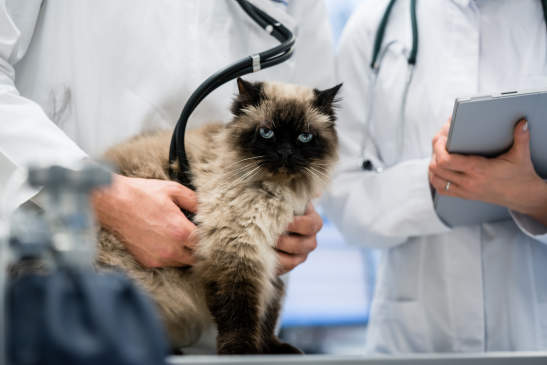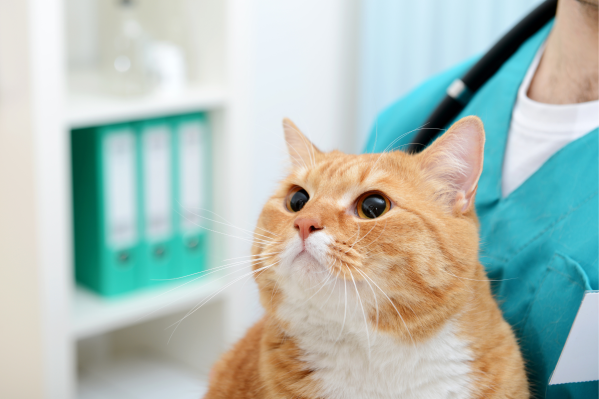There are few things worse than an unexpected vet bill. In fact, there are few things worse than vet bills at all. An emergency vet visit for your dog or cat can run you $150 even if it's just a false alarm — that number can climb into the thousands if it is in fact an emergency. No one wants to be in the position where they have to choose between a vet bill and a pet's life.
That's why Pawp broke down the average cost of wellness and emergency vet visits in a helpful guide entitled, "How Much Does The Vet Really Cost?" And today we're going to take that conversation one step further and discuss how to save money at the vet. Can't afford your vet bills? Here are some hacks to save you money in a pet emergency.
1. Talk to an online vet first
One of the most worrying aspects of a potential pet emergency is not knowing if, in fact, you are having an emergency in the first place. Heading to the vet for an unplanned visit can result in a minimum $150-$200 vet bill even if it's just a false alarm.
Online vets can serve as the first line of defense in an emergency and help you determine whether you require an in-person visit. The best way to save on a vet bill is to avoid getting one in the first place. Having a vet available 24/7 to guide you through an emergency can be both comforting and money-saving. If you're not sure if you should visit the vet, talk to an online vet first.
2. Compare different vets
If you are living in an area with a few different vets, don't be afraid to shop around. This may not be especially feasible in the event of a true emergency where you need a clinic, but if you're looking into a procedure, you should absolutely get a few different quotes from vets to see how they stack up.
You would be surprised how the exact same pet could get two quotes for the same thing, thousands of dollars apart.
3. Always ask for a written estimate
Before committing to anything with your vet, talk through the cost. Vets understand that pet owners are operating at different price points and may also suggest more affordable alternative treatments (and the pros and cons of both).
Knowing what the cost is from the outset will allow you to make the most financially responsible decision with your pet — and doing that with a few vets (via shopping around) can help you save a lot.

4. Look into Emergency Protection to pay your vet bills
If you're stuck with a large vet bill, there are a few options. Companies like Pawp offer $3,000 in emergency protection if you're a member, meaning you can get reimbursed for your vet bill. No deductible.
You can also start an HSA (Health Savings Account) so you can slowly contribute to a pool of funds in the event of an emergency. There are also companies that specifically help you pay back vet bills at your own pace.
5. Consider preventative care
Keeping your pet healthy starts with diet and exercise, but there are also preventative care treatments you can do to help. Start by brushing your dog's teeth and providing dental treats. Gum disease can cause a lot of health problems in both dogs and cats.
Read More: Why Good Dental Health Helps Pets Live Longer
Consider supplementing your pet's diet with extra goodies for their unique health needs — it could be in the form of skin & coat formula or digestion supplements. Preventing vet visits means being proactive, and who doesn't want to add a few years to their pets' lives?
Read More: Does My Dog Need Supplements?
6. Reexamine your vaccine schedule
While some vets are more stringent about bringing in your pet once a year for vaccines, research has demonstrated that many of the vaccines last longer than one year. Speak with your vet about adjusting a vaccination schedule that may make your regular in-person visits less frequent.
Read More: Should I Get My Dog Vaccinated? (Yes!)
7. Maintain a healthy food & exercise routine
It might seem obvious, but healthier pets have fewer problems and require fewer vet visits. Some of the most common health problems in dogs and cats are related to their weight and activity level. Make sure you're feeding your pet a nutrient-rich, age-appropriate diet with as few fillers as possible.
Read More: Is Your Dog Food Healthy Enough?
For dogs, make sure they are regularly walked. And for cats, make sure they are regularly played with. Obesity is common in both animals and especially in later ages... keep your pet healthy and lean and you'll reduce the amount of times you need to go to the vet.
